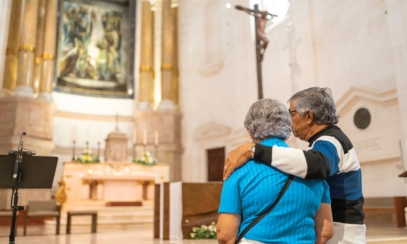
What should we make of celebrity converts?
I’ve noticed there have been a number of “celebrity conversions” to the Catholic faith recently. These individuals seem to be getting a lot of attention from Catholics online (both positive and negative). How should we respond to these new (and well-known) brothers and sisters?
I’ve noticed there have been a number of “celebrity conversions” to the Catholic faith recently. These individuals seem to be getting a lot of attention from Catholics online (both positive and negative). How should we respond to these new (and well-known) brothers and sisters?
I am grateful that you asked this question. In fact, I’ve been pondering this for a number of years now: What do we “do” with “famous Catholics”?
First, I think it is potentially valuable to understand ourselves. What is it about famous people that moves us to give their thoughts and actions so much weight? As human beings, we are oriented toward recognizing excellence. We are naturally (and divinely) disposed toward the True, the Good and the Beautiful. For whatever reason, celebrities often represent these qualities in our imaginations. Athletes reveal excellence in their sport (even if they do not always have excellence in other areas). Actors portray virtues (even if they do not always have those virtues in their real lives). Thinkers and politicians represent intelligence and influence (even if their thoughts and actions are not always in line with the True or the Good). Models symbolize beauty (at least in the externals).
Because of this, we place a certain burden upon these people. If they reveal excellence or portray virtue or represent our ideals in one area, they must be excellent or virtuous or live the ideal. Even when we know this is not true, it is a strong temptation.
Not only that, but we as Catholic Christians can often feel a bit out of step with the rest of the world. While a person can freely practice their Catholic faith in this country and culture without much fear, there is still something counter-cultural about being a fully committed Catholic. Clearly, we are meant to be “in the world, but not of it.” Yet feeling like one is on the outside can be a genuine experience.
Because of this, there is something about having someone famous “on our team.” It can give us the illusion of validation. It reminds us that there are people who represent what the world values who believe what we believe. And there is something strangely comforting about that.
Nonetheless, I do maintain that it is merely the illusion of validation. The only thing that actually validates our faith is reality. The only reason to believe anything is not because someone we like or respect believes it but because it is true. Any other reason is substandard and illusory.
In spite of all this, there might be something deeper going on with our preoccupation with celebrity conversions, something that is not shallow and is not manipulative, something that speaks to the hope we have as believers in Christ. It is the hope that stirs in us at every Easter Vigil when we see people come into the church seeking baptism, full communion with the Church and the other sacraments of initiation. Whenever we see all of those people turning away from whatever kind of life they had previously lived and toward the Lord, it reminds us that no one is so far gone that they are ever truly beyond God’s reach in this life.
When we see someone say “yes” to Christ and to his Church, it reminds us that even those people who are close to us, our loved ones for whom we have prayed for years, could still allow God’s grace to break into their lives and bring them home. Sometimes the celebrities among us have lived very public lives far from God, and the fact that God was able to get their attention and draw their hearts to himself gives us the courage to keep praying for those we love. They are witnesses to the fact that God relentlessly pursues every one of us.
In this sense, it is right that we give attention to converts. Whether they are celebrities or less well-known, they are a sign of hope. And in their conversion, they have become our brothers and sisters.
This is the heart of the reason we would attend to them: not because they are famous, but because they are family. Not because they are significant, but because they are now our siblings. Not because they are more important than the next person, but because they are no less important than the next person.
We must attend to them in the same way we would attend to our younger brothers and sisters. In their journey, they will need support, encouragement and prayers.
Of course, it should go without saying that they do not need the help of a “keyboard warrior.” While their conversion to the Lord might be public, all guidance ought to be personal. This means that it ought to come from their pastor and their local parish – not from me, and not from you.
To place ourselves in the position of moral guide for strangers would be to endanger our own souls. We are not their teachers, but their local community might be. In addition, they are not yet our teachers, but some of them might one day have much to share with us about how God has worked in their lives and how he wants to work in ours.
In the meantime, we remember what St. Paul wrote to St. Timothy about bishops in the early Church: “He must not be a recent convert, or he may become puffed up with conceit and fall into the condemnation of the devil.” (1 Tim 3:6)
Any convert, famous or not, is precious in the eyes of God. He died so they could have new life through the Church and the sacraments. And we ought to see them in this way, not because they are recognized by the world, but because they are known by God, not because they matter to their fans, but because they matter to God.
Father Michael Schmitz is director of youth and young adult ministry for the Diocese of Duluth and chaplain of the Newman Center at the University of Minnesota Duluth. Ask Father Mike is published by The Northern Cross.



